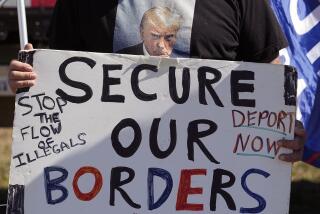NEW VISION FOR THE OLD WORLD : U.S. Focus Shows Subtle Shift to Next Generation : Politics: While Clinton is clearly backing Yeltsin, the American is hedging his bets by rubbing shoulders with up-and-coming leaders.
- Share via
MOSCOW — President Clinton’s first summit visit to Russia on Thursday reflected two concerns that have come to dominate U.S. policy toward its troubled former adversary: keeping up the pace of economic reforms to erase the legacy of communism at any cost, and quietly preparing for the day when President Boris N. Yeltsin is no longer in power.
In the short term, Clinton’s hopes for Russia remain solidly with Yeltsin, and the President spent almost eight hours extolling his leadership and bonding with the Russian leader, including a brisk 20-minute walk through snowy Kremlin courtyards and a three-hour-long banquet that boasted caviar and braised moose lips.
But in more subtle ways, Clinton and his aides are beginning to focus as well on the next generation of Russia’s leaders--from Yeltsin’s own lieutenants to the rising stars of the newly elected Parliament.
“The theme of this summit is: Beyond Yeltsin,” said Andrei Kortunov, a leading Russian expert on East-West relations. “It isn’t explicit. But if you look at Clinton’s agenda, the people he is meeting and the things he is saying, it shows that the Americans are moving away from their dependence on one man and preparing for what comes later.”
A senior U.S. official agreed. “Yeltsin won’t be around forever,” he said. “We want to do what we can to support all the forces of reform, so that after Yeltsin is gone the process will continue.”
Clinton is not abandoning Yeltsin; far from it. Indeed, critics in both Moscow and Washington complain that the Administration still relies too much on the Russian leader.
But Yeltsin’s health has been notoriously uneven. Some U.S. officials doubt that he will run again after his term ends in June, 1996; some Russians wonder whether he will survive until then.
Thus, officials noted, one of Clinton’s most important events on Thursday was a reception at Spaso House, the residence of the American ambassador here, where the President met dozens of members of the new Russian Parliament--including, along with reformers, one unreconstructed Communist and a polite young associate of fiery ultranationalist Vladimir V. Zhirinovsky, whose party shocked many with its strength in December’s parliamentary election.
Zhirinovsky, who has proposed reconquering all the lands of the old Russian Empire including Alaska, was pointedly not invited. But by welcoming one of his followers, Clinton sent a signal that the United States is willing to work with Russian nationalists if they moderate their positions.
At the same time, Clinton and his aides have been carefully cultivating the next generation of leaders in Yeltsin’s camp--while trying not to play favorites. At a briefing for reporters Thursday, one senior Administration official lavished praise on Deputy Prime Minister Yegor T. Gaidar, a leading voice for economic reform--and then added guiltily: “I meant to say some nice things about (Prime Minister Viktor S.) Chernomyrdin,” Gaidar’s main rival in the government.
To many Russians, the main message of Clinton’s visit is still an endorsement of Yeltsin that U.S. officials hope will bolster his standing against Zhirinovsky, the resurgent Communists and other extremists.
“The visit means that the West’s confidence in Yeltsin remains valid after the (parliamentary) election,” said Mikhail Berger, an editor of the leading newspaper Izvestia. “This is very important for Yeltsin’s team. It suggests to Russians that nothing terrible has happened, everything is going its due course.”
At the same time, Berger said, Clinton appears to be “boosting Chernomyrdin as the most likely successor” to Yeltsin.
*
Pavel G. Bunich, a leading reform economist who is critical of Yeltsin, said Clinton has done a good job of widening his contacts within the government but has not reached out enough to the opposition. “He’s still betting all his money on one horse,” he said.
In a larger sense, the proliferation of American contacts with Moscow’s politicians reflects the gradual normalization of U.S.-Russian relations--from the Cold War, when a cordial handshake between a President and a Soviet leader seemed to spell the difference between peace and war, to the kind of routine relationships the United States carries on with most countries in the world.
That change was reflected as well in Clinton’s agenda for this meeting. The U.S.-Soviet summits of the Cold War focused on avoiding confrontation and averting the danger of nuclear war; the U.S.-Russian summits following the collapse of the Soviet Union in 1991 centered on launching economic aid programs to move the former Communist states toward Western-style capitalism.
*
Now, the focus has moved once again--to making existing Western aid programs work, especially in easing the privation suffered by ordinary Russians as old economic structures die.
“Russian-American relations have passed the period when their relations focused on humanitarian and other assistance to Russia at the initial stage of reform,” said Georgy Mamedov, deputy foreign minister. “Now they have moved on to macroeconomic partnership, support for structural reform in Russia, transformation of relations between Russia, its neighbors and large countries of the world.”
The tone of the meetings has changed as well, U.S. and Russian officials said.
“What was different about today’s meeting? There were no cold faces and frozen formal phrases that were so typical of summits past,” said Dmitry V. Ardamatsky, a presidential spokesman.
More to Read
Get the L.A. Times Politics newsletter
Deeply reported insights into legislation, politics and policy from Sacramento, Washington and beyond. In your inbox twice per week.
You may occasionally receive promotional content from the Los Angeles Times.










